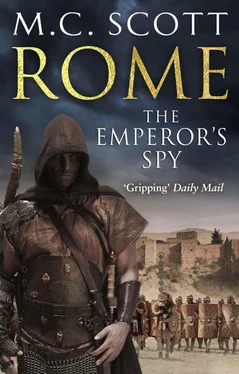M. Scott - Rome - The Emperor's spy
Здесь есть возможность читать онлайн «M. Scott - Rome - The Emperor's spy» весь текст электронной книги совершенно бесплатно (целиком полную версию без сокращений). В некоторых случаях можно слушать аудио, скачать через торрент в формате fb2 и присутствует краткое содержание. Жанр: Исторические приключения, на английском языке. Описание произведения, (предисловие) а так же отзывы посетителей доступны на портале библиотеки ЛибКат.
- Название:Rome: The Emperor's spy
- Автор:
- Жанр:
- Год:неизвестен
- ISBN:нет данных
- Рейтинг книги:3 / 5. Голосов: 1
-
Избранное:Добавить в избранное
- Отзывы:
-
Ваша оценка:
- 60
- 1
- 2
- 3
- 4
- 5
Rome: The Emperor's spy: краткое содержание, описание и аннотация
Предлагаем к чтению аннотацию, описание, краткое содержание или предисловие (зависит от того, что написал сам автор книги «Rome: The Emperor's spy»). Если вы не нашли необходимую информацию о книге — напишите в комментариях, мы постараемся отыскать её.
Rome: The Emperor's spy — читать онлайн бесплатно полную книгу (весь текст) целиком
Ниже представлен текст книги, разбитый по страницам. Система сохранения места последней прочитанной страницы, позволяет с удобством читать онлайн бесплатно книгу «Rome: The Emperor's spy», без необходимости каждый раз заново искать на чём Вы остановились. Поставьте закладку, и сможете в любой момент перейти на страницу, на которой закончили чтение.
Интервал:
Закладка:
The younger was hewn from rougher rock. The eagle’s crag nose and the long, uncut hair said that he hailed from Galilee, where the rule of Rome did not reach, where men thought themselves more righteous than their neighbours in Judaea, who lived in thrall to an emperor who called himself god.
If his hair showed where this man was born, the style of his tunic and the knotted leather labelled him beyond doubt as a zealot of the Sicarioi, the Hebrew assassins named for the curved razor-knives with which they slew the unbelievers and traitors, serving with a fierce fanaticism the word of their master.
True to his calling, the Sicari had killed once already that night; his curved knife was wet with new blood. He padded past, more silent than any leopard, and of the group, he alone knew no fear. His eyes searched the dark, and the light of their look fell on Sebastos so that they stared at one another face to face, or it seemed so.
Sebastos thought he might die then, pierced by that look, or the knife that must surely follow. He screwed up his courage to meet both with honour, but the restless gaze passed on without pause, as if it were normal to see a boy hiding in the dark on this night in this garden.
The small group was almost out of sight when Sebastos dared to breathe again, and slowly to inch his way up the slope behind them.
His night was changed beyond recognition. He had come because he feared the sky might fall on his head and it had done, so that his soul was crushed and the light snuffed out of his heart. His hope now lay in seeing his father set things to rights, as he had done so often in the past.
‘He’s alive. We will take him now. We owe you more than thanks.’
The woman stepped from the tomb’s dark to the light of the coming dawn. She gave her news to the Sicari zealot, to Sebastos’ father, to the garden, to the waking birds, to the world. Exhaustion and relief cracked the liquid bronze of her voice.
For a moment, nobody answered. They stood in the part-time between night and day. The cloud had lifted at last, leaving the final stars to blaze at the rising sun. The watch-fire was a crimson haze in the greys of almost-morning. By its light, the Sicari brought from the depths of his tunic a purse of poor hide, with the stitching frayed away at the seams. Silver spilled from it, easy as rain.
From his cramped, cold place of watching, Sebastos saw his father’s head snap round in shock. His hand dropped to his knife.
‘Do you think money bought him? Truly?’
His voice promised violence, for the cleansing of an insult. The Sicari looked as if he would happily oblige, but before either man could move the woman stepped forward, saying, ‘Shimon, that was not called for,’ and the man so named shrugged and stooped to gather his insult and when he rose again with the silver clenched in his fist, the moment for fighting had passed.
The woman ducked back into the tomb and returned moments later with the grey-haired rabbi. Between them, they carried a burden that was passed with infinite care through the low opening in the rock face.
The stench of blood was overpowering. Out of respect for his mother, Sebastos turned his face away. Other men took their sons to see the executions, believing fear was the best teacher and that only thus could they keep the hot blood of young men from frothing into open rebellion against the grinding-heel of Rome. When Sebastos’ father had prepared to do the same, his mother had stood in the doorway and forbidden it — the only time in his life Sebastos had seen her truly angry.
She was red-haired and taller than his father and while she might once have been his slave, she was free by then, and could speak her mind. At the height of the vicious row that followed, she spat a single word in a language Sebastos did not understand — a name, perhaps. It crashed through their hut like a living bull, leaving shock and silence in its wake.
White-faced, his father had turned on his heel and gone back to the barracks and not returned for nearly a month.
He had not taken his son to the place of execution then or later, but he had made sure Sebastos knew precisely the death inflicted on men who were caught in insurrection against the rule of Rome, the indignity of it, and the appalling duration that could span as much as three days of increasing, unremitting agony.
‘If they like you, they’ll break your legs,’ he had said. ‘Death comes more swiftly, but the pain before is greater.’ Worst, obviously, was the loss of honour, so much worse than a death in battle.
At the end, in case his son might not believe such a thing could happen to him, Sebastos’ father had filled the rest of that evening by reciting aloud the names of the five hundred young Hebrew men who had each been nailed to a cross on a single day after the fall of Sepphoris to the rebel leader known as the Galilean, and his army of zealots.
Whatever his intention, the father had succeeded in terrifying his son. Every night for the two years since that blood-stained evening, Sebastos had woken in the grey early morning sweating for terror of a threat that was as great as his fear of the falling sky.
But his father had failed in so far as Sebastos had not at any time, then or later, ceased to regard the Galilean as his hero, however many young men he might have led to their deaths.
The Galilean was everyone’s hero, even if he was the enemy. His growing band of followers drew young men from all quarters of the divided Judaea, uniting them in hatred of Rome and its rule. Sebastos might have considered himself loyal to the emperor, might have held in his heart the dream of Roman citizenship as the ultimate prize, but that did not stop him from idolizing a man who, by force of character, courage and arms, had stayed one step ahead of the legions for nearly four decades.
At a time when the Sadducee high priests kept themselves fat on the prefect’s leavings and counselled the proper paying of taxes, the Galilean and his hand-picked groups of Sicari zealots stole the taxes from the Herodian collectors and sent them back whence they came. Like every boy he knew, Sebastos burned to be a hero one day, and the Galilean showed how it could be done, even if he had set his sword against the might of Rome, and was thus destined to failure.
Over the years when mothers used the name to frighten their children into good behaviour, the Galilean had grown in Sebastos’ estimation to be a Hercules: courageous, astute and honourable, an indefatigable defender of the poor. Until that morning, when the hero had suffered exactly the death Sebastos’ father had so vividly described.
Sebastos was one of the few not to have seen it. As far as he was concerned, he remained under oath to his mother not to view a death by crucifixion unless it were his own, and he did not break his promise to her now, for the Galilean was not dead when the woman and the Pharisee brought him out of the tomb.
That might have been surprising, except that he had not hung for three days as he should have done, but had been cut down on the prefect’s orders at the eleventh hour, just before dusk, that his corpse might not profane the Passover Sabbath that began at sunset. In a city so prone to riots, it was a necessary precaution.
Sebastos’ father had said aloud at the time that he must have been very sick to have died so quickly, but it was a mercy, and he did not begrudge any man a swift death. That had been a lie to add to betrayal; Sebastos’ father had told the woman that he knew the Galilean was alive when they moved him to the tomb.
What kind of man tells lies to his own son?
Cold rage opened Sebastos’ eyes as the small cavalcade brought the not-dead man past his hiding place. He saw clearly the bandaged flesh, the ruined skin, the gaunt, unshaven face and the sunken eyes set deep within it, still clinging to their spark of life.
Читать дальшеИнтервал:
Закладка:
Похожие книги на «Rome: The Emperor's spy»
Представляем Вашему вниманию похожие книги на «Rome: The Emperor's spy» списком для выбора. Мы отобрали схожую по названию и смыслу литературу в надежде предоставить читателям больше вариантов отыскать новые, интересные, ещё непрочитанные произведения.
Обсуждение, отзывы о книге «Rome: The Emperor's spy» и просто собственные мнения читателей. Оставьте ваши комментарии, напишите, что Вы думаете о произведении, его смысле или главных героях. Укажите что конкретно понравилось, а что нет, и почему Вы так считаете.












